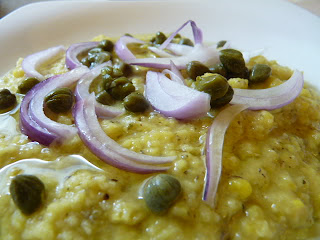
No I am not going to start waving flags suddenly, believe me this came as a surprise.
As a kid I used to hate gigantes, those farty big beans that my grandmother would cook with such pride, devotion and zest.
Then I loved them suddenly , one hot summer night in Ios, with ouzo. But I was drunk so I forgot everything about them.
Last weekend a friend came over to stay with us which was a good excuse for a BBQ and a little dinner party. He offered and cooked Gigantes beans in the oven, 'plaki' as they call them in Greece. My boyfriend went ballistic. Why have I never cooked that masterpiece for him in the past?
Well this weekend I finally did. Being lazy, I used canned butter beans, nothing of the patient soaking overnight process that grandma loved and was such an important part of her 'Gigantes' ritual.
Ingredients
300 grams gigantes beans or butter beans
2 bay leaves
1 large onion, finely chopped
2 cloves of garlic
1/3 cup of olive oil
6 ripe tomatoes, peeled and blended or 1 can of whole tomatoes (500 grams)
1 tablespoon tomato paste
1/3 cup white dry wine
1 cup of parsley, finely chopped
2 stalks celery ribs, finely chopped
3 big carrots, finely chopped
fresh oregano, finely chopped
A few sprigs of dill, finely chopped (optional)
1 tablespoon salt
Freshly ground black pepper
1 tablespoon thyme honey (optional)
2 cups water
Directions:
Soak beans in plenty of water, overnight. Or use canned beans if you are lazy like me.
Drain and add fresh water and bring to a boil and remove any froth with a slotted ladle. Drain them again and add fresh water and bay leaves and bring to a boil, lower heat and simmer until almost cooked (about 1 hour and 30 minutes) and then drain and discard the bay leaves.
Preheat oven at 180o C 350o F.
Heat olive oil in a sautéing pan and sauté onions and garlic until translucent.
Add chopped celery, carrots, parsley, fresh oregano and beans and mix.
Add wine, honey, tomato, salt and pepper and water and mix.
Cover the sautéing pan or cook in a casserole dish in the oven for about 1 hour and 15 minutes until the beans are soft and the sauce is thick, mixing at regular intervals.
Serve with olives, feta cheese, tzatziki and bread.








